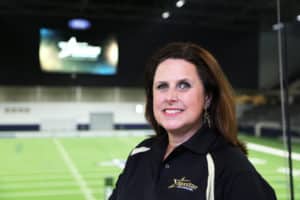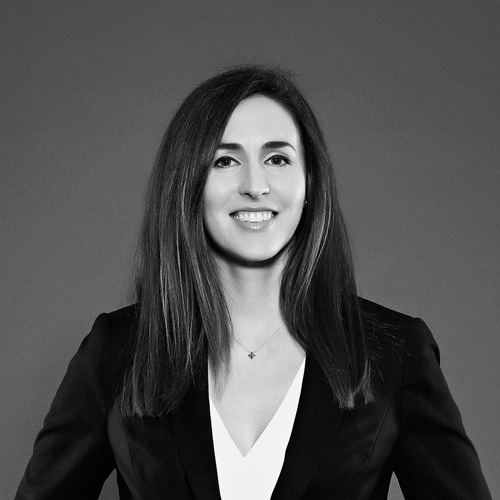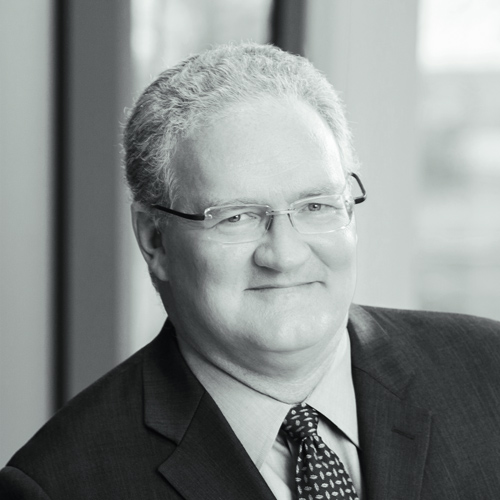
If you had told a young Elizabeth Ryder that she would one day be both the general counsel of a multibillion-dollar media company and an avid skydiver, she would have thought you had a screw loose. “I wanted to be a fashion buyer,” Ryder recalls. “I had a good clothing sense and thought it would be fun hanging out with all the glamorous people. As far as skydiving, I always wanted to try it, but it took a friend to push me into it. I’m one of the most unathletic people I know.”
But similar to skydiving, life is full of ups and downs. To pursue her fashion dreams, Ryder earned a degree in marketing/advertising and landed a job in Dillard’s management training program. The only problem was she didn’t enjoy having to work holidays. This led to her becoming a contracts administrator at Pitney Bowes, and it wasn’t until she volunteered to do some legal research for a relative that something else clicked altogether.
“I liked the work and, on a whim, decided to take the LSAT,” she says. “I envisioned myself as Perry Mason, but after one mock trial in law school, I realized that wasn’t for me.” An FCC internship introduced her to media law in 1994 during two momentous events for the agency: its investigation into Howard Stern and Clear Channel (now iHeartMedia) and its adoption of children’s programming regulations. “That experience taught me a lot about pubic airwave regulations,” Ryder recalls.
She spent the next several years in communications law in Washington, DC, including five years at Drinker Biddle & Reath. “I enjoyed what I did, but I didn’t see myself as partner track material,” she says. “I didn’t want to have to hustle for clients or play politics with other partners.”
In 2007, First Broadcasting in Dallas hired her as vice president of legal affairs. The job got her back to Texas and showed her the benefits of in-house work. “I didn’t have to bill my time in six-minute increments or try to keep a lot of different clients happy,” she says.
After First Broadcasting closed, Ryder reconnected with the management team at Nexstar Media Group in Irving, Texas (formerly Nexstar Broadcasting Group). She had done work for the company when she was at Drinker Biddle, and it needed some temporary help. Nexstar eventually asked her to come onboard as its first in-house attorney. “It was a good company, and I liked the people,” she says. “Of course, at the time, I didn’t know that Perry Sook, the CEO, wanted to own the universe.”
When Ryder joined in 2009, Nexstar operated or provided services to forty-two TV stations. To this day, it is the nation’s second-largest independent owner, with 170 stations in one hundred markets. The company’s largest growth spurt came with the $4.6 billion purchase of Media General in early 2017.
Nexstar serves 39 percent of US households, which is the current ownership cap set by the FCC. However, in April 2017, the FCC voted to ease the rules by reinstituting a discount for UHF stations, which takes the cap to 78 percent. There have been judicial challenges, though, and the rule change is currently before the DC Court of Appeals. If the change goes through, Nexstar, along with several other companies, is expected to look for new accretive opportunities.
“We’re just waiting to see what happens,” Ryder says. “That’s one of the fascinating things about media law. Something new is always happening.”
Ryder now oversees four other attorneys and three paralegals. A major issue they’re currently dealing with is the industry’s new ATSC 3.0 transmission standard. “The previous standard is twenty years old,” she says. “ATSC 3.0 reflects the latest technological advances and will enable broadcasting companies to launch new services through the TV, like geographically targeted emergency alerts and automatic device turn-on for such alerts.”
Simultaneously, the company is also being required to relocate ninety of its television stations to new channels. This is a result of the spectrum auction, where broadcasters sold some of their spectrum to companies such as T-Mobile, Comcast, and DISH Network.
“I envisioned myself as Perry Mason, but after one mock trial in law school, I realized that wasn’t for me.”
One could imagine that all of this would provide enough of a challenge, but Ryder decided to keep her personal life as invigorating as her professional one by taking up skydiving. She had just started working at Nexstar when a friend told her that jumping out of a plane was on her bucket list. Ryder soon asked to join her on a jump. “That first tandem jump was sensory overload,” Ryder recalls. “I thought it was really cool and wanted to do it over and over again.” She was hooked—in more ways than one. “The instructor was so great. In fact, I married him,” she says.
Ryder earned her A license so she could perform group jumps, then completed the fifty jumps and other requirements for a B license, which entitles her to jump from specialty aircrafts and at night. “Night jumps are extremely calm and peaceful, though, my depth perception can be a problem on landing at times,” she says. “Jumping out of hot air balloons is also very cool, but you have to deploy your parachute very quickly. A B-25 was probably the most exciting jump. It was sheer luck that we got to do it. We just happened to be in the right place at the right time.” It’s a sentiment that pretty much sums up her life so far, she notes.
Ryder performs about 150–200 jumps a year, or “as many as work and weather will allow.” She attends women’s skydiving events and competitions with her husband/former instructor Dave and even goes on skydiving-themed vacations. “I love the people I skydive with,” she says. “They’re my second family.”
Ryder admits that some of her friends and family—especially her mom—worry about her pastime, but says that Nexstar’s CEO encourages her. “Jumping takes the edge off if I’m anxious or stressed about something,” Ryder says. “Extreme sports are good that way. When I bike ride, for instance, I’m thinking about work and the other things I need to do. When I jump, work doesn’t enter the picture. It’s the one thing I do that requires my complete and total focus on what I’m doing that moment, and that ends up having a very calming effect.”
It’s a great feeling for Ryder to know she has landed well, not only at work, but also in her life outside the office.
***
Durham Jones & Pinegar:
“Elizabeth’s terrific people skills and close attention to business and litigation detail deliver outstanding business and litigation results for Nexstar’s management and shareholders. We are grateful for our successful partnership with her.”
—Mark Gibb, Shareholder
***
Paul Hastings LLP:
“Elizabeth’s industry knowledge and her command of the law have made her both a behind-the-scenes influencer in business and a leader in the media law bar.”
—Eric D. Greenberg, Partner, TMET Mergers & Acquisitions

